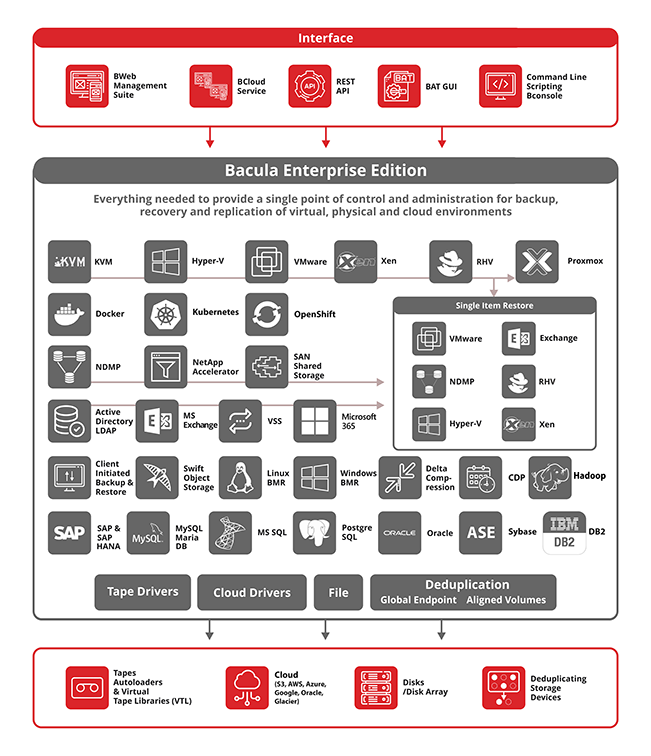NAKIVO Backup & Replication is a versatile and effective backup and recovery solution with a lot of emphasis on VM backups. It is one of the most well-known backup solutions on the market, and its overall capabilities should be enough to satisfy many different client types.
4.8 out of 5 rating based on 378 customer reviews, according to Capterra
Advantages. NAKIVO is easy to use, it supports both VMware and Hyper-V, and can also be deployed either on-premise or in the cloud; it is generally considered one of the best solutions on the market when it comes to SMBs.
Shortcomings. The overall customer experience with this solution seems to be extremely inconsistent, and the solution itself seems to be lacking some of the rather important security features, such as Two-Factor Authentication.
Druva Data Resiliency Cloud is a backup-centered solution with many different capabilities. Druva is a full-on SaaS data protection solution that offers not only data protection features but also data cybersecurity and data governance.
4.6 out of 5 rating based on 531 customer reviews, according to G2
Advantages. It claims to be one of the fastest solutions on the market in terms of both backup and recovery speed, while also having extensive archival capabilities, backup air gapping, compliance monitoring, automatization, and a feature-rich dashboard.
Shortcomings. The solution’s overall complexity can be overwhelming to some users, especially the ones with little or no prior experience with data protection solutions, and the licensing model has a number of issues if the license in question was not originally bought from an MSP.
SEP sesam is a great data protection solution from Germany. It is a backup and recovery solution for both physical and virtual environments that is highly effective, secure, versatile, and can guarantee support for many different data storage types.
4.6 out of 5 rating based on 178 customer reviews, according to Gartner
Advantages. It can work on Windows, Linux, and Unix-based systems, supports a variety of database types such as PostgreSQL, MySQL, Oracle, MariaDB, and SAP HANA, and a variety of virtualization environments, such as VMware, Hyper-V, KVM, Red Hat, Citrix, and others.
Shortcomings. Some user reviews are stating that the initial setup is long and complicated, the process of implementing new features and fixing bugs in the existing ones is rather slow, and the overall UI/UX is far from perfect.
Zerto Platform offers a range of features centered around data management and information security – all in a single platform. It is a fast and reliable data recovery platform with multiple features and capabilities included in the package.
9.1 out of 10 rating based on 119 customer reviews, according to TrustRadius
Advantages. Zerto is easy to set up initially, and it can also offer a user-friendly interface, low RPO/RTO, bubble testing capabilities, and many others.
Shortcomings. There are also some parts of Zerto that are not exactly favorable, such as its lackluster customer support, rigid-structured dashboard, limited compatibility with hypervisors, a lack of extensive automation capabilities, and more.
These examples are just a fraction of the backup software market, with many other solutions capable of keeping up with Commvault’s feature set or even exceeding it in some cases.
Another notable backup and recovery that is worth mentioning is Bacula Enterprise, which shares many common features with Commvault, but tends to be more advanced in terms of security, ransomware protection, customization possibilities and more modern GUI. In addition, Bacula’s open source base reduces the risk of vendor lock-in, and its subscription model typically offers significantly reduced licensing costs.
Bacula allows companies to implement a solution that makes optimal use of the platform’s resources, readily integrating with a wide range of technologies and lowering operating costs. For managers, Bacula is especially strong in the area of reporting, monitoring and helping organization leaders meet compliance and regulatory needs.
9.7 out of 10 rating based on 56 customer reviews, according to TrustRadius
Advantages. Bacula Enterprise is a backup platform with an impressive number of capabilities and features, and the overall feature set can also be expanded using the system of modules that the software provides. The solution also excels at data security and supports plenty of different storage types and environment variations.
Shortcomings. The total number of different features and capabilities can make the software slightly overwhelming to new users. Some of the lesser known modules also have a separate price tag, on top of the subscription fee that Bacula takes.
There is plenty of overlap in terms of features between Bacula Enterprise and Commvault as competitors in the field of enterprise backup software. Their architectures are somewhat similar, however Bacula allows companies to implement a solution that makes optimal use of the platform’s resources, maximizing on existing technology with low operating costs. It also provides a wider choice of deduplication options too, and more interoperability with different VM’s and container-types.
Bacula is also exceptionally adaptable to the requirements of processes and users in an agile and flexible way. With its centralized administration and control console, coupled with easy to use interfaces, it offers an exciting alternative. The Trial software can be found here.





